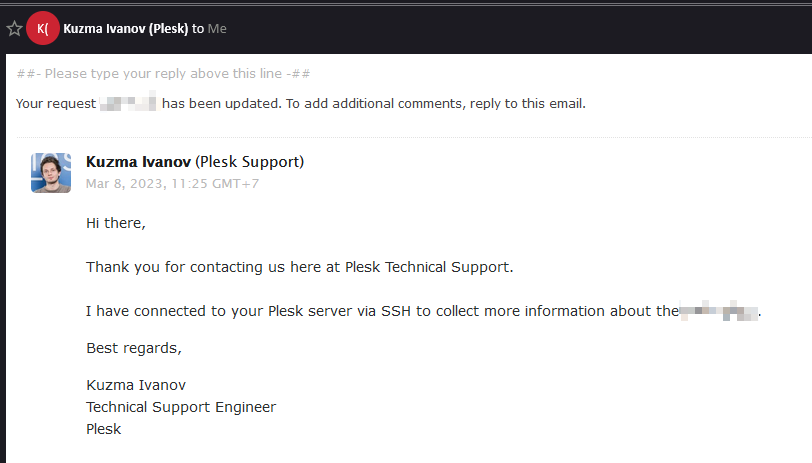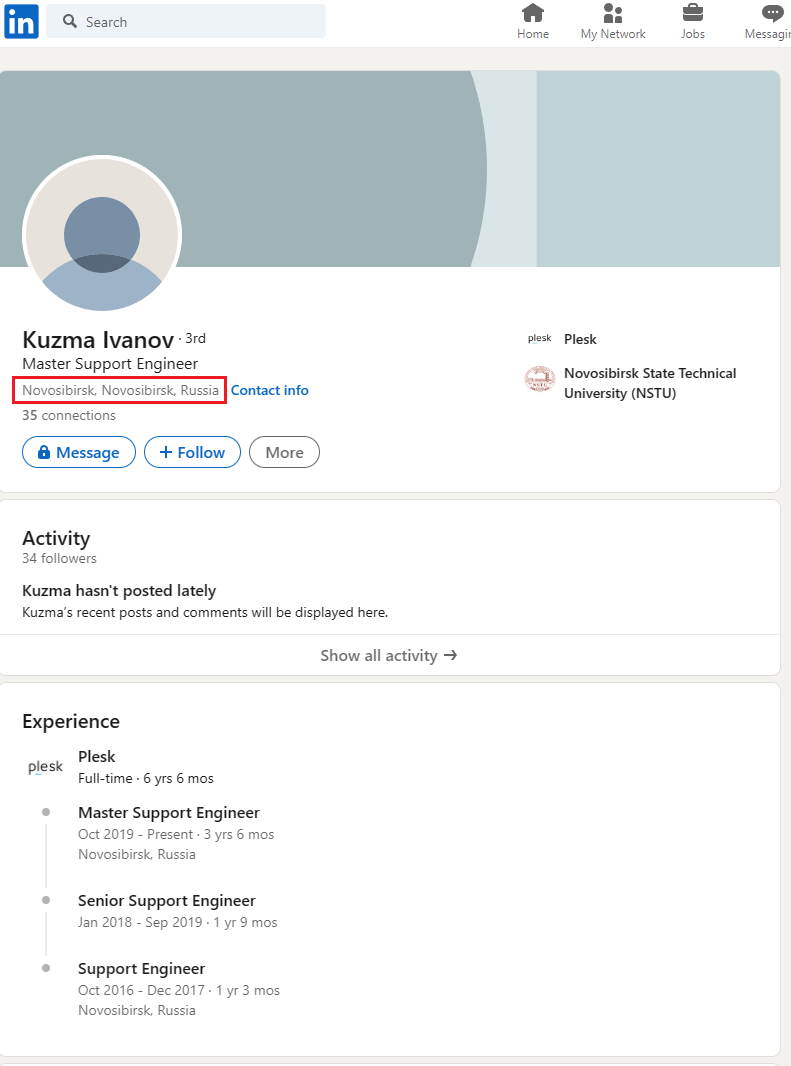In the wake of upcoming events we'd like to know by which entity the Plesk Knowledge Base is being hosted and in which country these servers are located? Is the Knowledge Base owned by the Swiss Plesk entity, for example and is it hosted in Switzerland? Or is it hosted in Russia and owned by the Russian Plesk entity? Are there mirrors where the Plesk Knowledge Base can also be accessed in case access to the original servers becomes difficult?
-
If you are still using CentOS 7.9, it's time to convert to Alma 8 with the free centos2alma tool by Plesk or Plesk Migrator. Please let us know your experiences or concerns in this thread:
CentOS2Alma discussion
You are using an out of date browser. It may not display this or other websites correctly.
You should upgrade or use an alternative browser.
You should upgrade or use an alternative browser.
Resolved In what country and by what entity is the Plesk Knowledge Base hosted?
- Thread starter Bitpalast
- Start date
danami
Silver Pleskian
@Peter Debik support.plesk.com is using Cloudflare so content is going to be sent from your servers closest Cloudflare server. Here are the ranges:
IP ranges

 www.cloudflare.com
www.cloudflare.com
Datacenters
 www.cloudflarestatus.com
www.cloudflarestatus.com
IP ranges

IP Ranges
This page is intended to be the definitive source of Cloudflare’s current IP ranges.
Datacenters
Cloudflare Status
Welcome to Cloudflare's home for real-time and historical data on system performance.
What do you mean, Peter?In the wake of upcoming events
danami
Silver Pleskian
I wouldn't think that is an issue. If I remember correctly Plesk is owned by WebPros HoldCo B.V. Amsterdam, Netherlands and WebPros itself is owned by
CVC capital partners. Only some of the developers are based out of Novosibirsk, Russia.
CVC capital partners. Only some of the developers are based out of Novosibirsk, Russia.
According to the Plesk website, Plesk is actually a Swiss company:
"Plesk International GmbH is a subsidiary of Particle Investments S.a r.l. (LUX) and is a limited liability company under Swiss law, registered in Canton Schaffhausen under commercial register number CHE-278.733.710"
However, the question is, if the licencing server for example (for monthly licence renewal) is actually operated in Switzerland or Europe or another Western nation or whether operations of the system need access to the Internet inside Russian Federation.
I did not want to expand this too much, I was just wondering whether financial or other sanctions could have an impact on business continuity of Plesk users.
"Plesk International GmbH is a subsidiary of Particle Investments S.a r.l. (LUX) and is a limited liability company under Swiss law, registered in Canton Schaffhausen under commercial register number CHE-278.733.710"
However, the question is, if the licencing server for example (for monthly licence renewal) is actually operated in Switzerland or Europe or another Western nation or whether operations of the system need access to the Internet inside Russian Federation.
I did not want to expand this too much, I was just wondering whether financial or other sanctions could have an impact on business continuity of Plesk users.
D
Deleted member 209767
Guest
What if Russia is locked out of the SWIFT system due to sanctions? Will you still be able to process payments from North America users?
Note that Plesk is not a Russian company, and its infrastructure is not in Russia.What if Russia is locked out of the SWIFT system due to sanctions? Will you still be able to process payments from North America users?
Last edited:
I understand your concern. Believe that Plesk is doing everything necessary so that no external problems disrupt its stable operation.I'm in the EU and I'm also worried how sanctions will affect my Plesk running servers, either license payment or services.
Not looking for a definitive answer because most likely nobody knows at this point the full repercussions. just voicing the concern.
DieterWerner
Regular Pleskian
Plesk is in the comfortable situation that Switzerland does not join the European sanctions.I understand your concern. Believe that Plesk is doing everything necessary so that no external problems disrupt its stable operation.
Well, this has changed since last week, so even Switzerland joined most sanctions. Thus, essential questions that remain are:Plesk is in the comfortable situation that Switzerland does not join the European sanctions.
1) If development happens mostly in Russia but there is no way to transfer money - how will developers be paid and which consequences will arise for the development and support of Plesk.
2) In Europe, there is more and more a discussion (see for instance How Russia's invasion of Ukraine threatens the IT industry | ZDNet and Kaspersky & Co.: Politiker fordern Neubewertung russischer Sicherheitssoftware) to what extent software built in Russia may be continued to use given the current situation.
It is very interesting that Plesk did not release any official public statement about this yet.
@B_P The knowledge (code, bug fixes, documents) are stored in Switzerland. All necessary systems are running in the cloud and are controlled from outside of Russia. We can provide bug fix/maintenance through our international teams should it be necessary.
We will continue to monitor this unpredictable situation as it evolves and update our team members, partners, vendors, and customers as any new information comes to light. We will also take the necessary steps to mitigate any negative scenarios and provide any required solutions as fast as possible, in compliance with all applicable laws.
We will continue to monitor this unpredictable situation as it evolves and update our team members, partners, vendors, and customers as any new information comes to light. We will also take the necessary steps to mitigate any negative scenarios and provide any required solutions as fast as possible, in compliance with all applicable laws.
@B_P The knowledge (code, bug fixes, documents) are stored in Switzerland. All necessary systems are running in the cloud and are controlled from outside of Russia. We can provide bug fix/maintenance through our international teams should it be necessary.
Dear @JesseA,
given the latest discussion related to Kaspersky software (see for instance Verwaltungsgericht: BSI warnt zurecht vor Virenschutzsoftware von Kaspersky and BSI warnt vor dem Einsatz von Kaspersky-Virenschutzprodukten), I wonder how Plesk would react if a similar warning is issued for Plesk. Due to the impression that most of the support (and development?) happens in Russia, I could imagine that a similar warning could be raised for Plesk in the near future.
While all clients would hope that Plesk is not affected, how can this be proven to calm down users and customers?
Best,
B_P
We will continue to monitor this unpredictable situation as it evolves and update our team members, partners, vendors, and customers as any new information comes to light. We will also take the necessary steps to mitigate any negative scenarios and provide any required solutions as fast as possible, in compliance with all applicable laws.
Dear @JesseA,
given the latest discussion related to Kaspersky software (see for instance Verwaltungsgericht: BSI warnt zurecht vor Virenschutzsoftware von Kaspersky and BSI warnt vor dem Einsatz von Kaspersky-Virenschutzprodukten), I wonder how Plesk would react if a similar warning is issued for Plesk. Due to the impression that most of the support (and development?) happens in Russia, I could imagine that a similar warning could be raised for Plesk in the near future.
While all clients would hope that Plesk is not affected, how can this be proven to calm down users and customers?
Best,
B_P
@JesseA, @IgorG is there actually any update on this?@B_P The knowledge (code, bug fixes, documents) are stored in Switzerland. All necessary systems are running in the cloud and are controlled from outside of Russia. We can provide bug fix/maintenance through our international teams should it be necessary.
Dear @JesseA,
given the latest discussion related to Kaspersky software (see for instance Verwaltungsgericht: BSI warnt zurecht vor Virenschutzsoftware von Kaspersky and BSI warnt vor dem Einsatz von Kaspersky-Virenschutzprodukten), I wonder how Plesk would react if a similar warning is issued for Plesk. Due to the impression that most of the support (and development?) happens in Russia, I could imagine that a similar warning could be raised for Plesk in the near future.
While all clients would hope that Plesk is not affected, how can this be proven to calm down users and customers?
Best,
B_P
@B_P what kind of update do you expect? As I said above, Plesk is not a Russian company, all of its infrastructure and employees are not in Russia. Those few who still remain in Russia will be laid off by the end of the year, including me. What else do you expect? For all Russian-speaking employees to be fired from Plesk? Or what?
Last edited:
@B_P I regret that I ever opened this topic. My intention was not to stir up concerns. The idea was only to understand the structure better and to be precautious and be prepared. At that time when I opened the topic I was unsure to what extent Plesk might be state-controlled. It turned out that it is not at all state-controlled. All current development is taking place outside Russia, and as IgorG already mentioned, the Russian entity is in the process of being closed down entirely. The business structures are practically all based in "Western" countries already.
It is extremely unlikely that BSI will have any concerns about Plesk now or in the future. The case of Kaspersky is an entirely different story as their location and business structure is completely different. For BSI I am pretty sure that they are monitoring the situation closely and will rather publish warnings if they see any issues with a system, network or groups. They have rather nerdy staff, it is good to have that institution. I sometimes wonder how little they appear in the public regarding the great work that institution is doing. So far, there are no known concerns.
@B_P I see that we have a common concern, and if you feel that there is more need for clarification, I am open for hearing more about it from you. If you wish to discuss this matter in more detail, please send me a PM.
It is extremely unlikely that BSI will have any concerns about Plesk now or in the future. The case of Kaspersky is an entirely different story as their location and business structure is completely different. For BSI I am pretty sure that they are monitoring the situation closely and will rather publish warnings if they see any issues with a system, network or groups. They have rather nerdy staff, it is good to have that institution. I sometimes wonder how little they appear in the public regarding the great work that institution is doing. So far, there are no known concerns.
@B_P I see that we have a common concern, and if you feel that there is more need for clarification, I am open for hearing more about it from you. If you wish to discuss this matter in more detail, please send me a PM.
magicnation
New Pleskian
I think Plesk support at least needs to let the customer know/choose who will access their server with full control. Especially for those people who are still in Russia, nothing wrong with the Russians, but the government.
The worst way to find out who they are accessing your server is via LinkedIn. I hope Plesk can do something and act quickly.


The worst way to find out who they are accessing your server is via LinkedIn. I hope Plesk can do something and act quickly.


Similar threads
- Replies
- 6
- Views
- 3K
E
- Replies
- 0
- Views
- 2K
E
G
- Replies
- 0
- Views
- 2K
G
- Replies
- 149
- Views
- 30K

